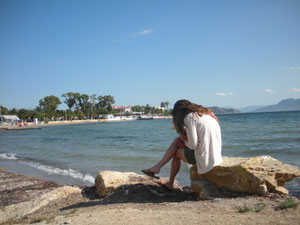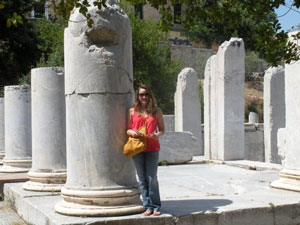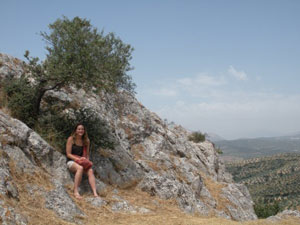Jennifer MacLure: Re-Visioning Myth through Poetry: The Delphic Oracle, Aphea, and the Eleusian Mysteries
Re-Visioning Myth through Poetry: The Delphic Oracle, Aphea, and the Eleusian Mysteries

For my Murray project, I undertook a creative writing project inspired by one of my favorite poets, Hilda Doolittle's (H.D.). Through studying her late long poems, Trilogy and Helen in Egypt, I became interested in the limitations of literature-the voices that are left out of the canon, the tendency for words to be misinterpreted and to change their meanings, and the way that truth sometimes resists being confined by a narrative. Like H.D., I become interested in storytelling as a means of rewriting canonical versions of history or myth to include voices that have been repressed. In H.D's poetry, as in the writing of many female authors, the repressed voice that she is most concerned with bringing to light is the voice of the silenced woman. With my Murray project, I had the opportunity to work on my own extended poem that re-imagines traditional myth to include and redefine the female voice.

I researched different versions of the myths surrounding the Delphic Oracle, the story of Aphea, and the myth of Demeter and Persephone and the Eleusian Mysteries. I then spent three weeks in Greece traveling to the ruins associated with each of these three myths, learning more about the myths and writing. I originally planned to devote equal parts of my poem to each of the three myths. Once there, however, I became particularly interested in the story of Aphea and decide to devote the majority of the poem to her and to use the other two myths in a supplemental way. Little is known of Aphea, a daughter of Zeus who is said to have disappeared into a temple of Athena while fleeing from an attacker. Her name actually means "the vanished." Because of my focus on voices that have been lost or covered over, I found her story to be a very interesting starting point for my project. Read some of my poem.

I continued to examine these themes in a critical way through my honors thesis, "'I refuse these givens:' Reintegrating the Split Self in the Poetry of H.D. and Adrienne Rich." In my thesis, I explored the way in which H.D. and Rich reinterpreted traditional myths of motherhood and authorship in order to shape their own identities as female poets.














